
A new wearable removes the guesswork from breastfeeding
While breastfeeding offers numerous benefits for both mother and baby, one challenge has persisted: It’s nearly impossible to know how much milk a baby is consuming.

A new wearable removes the guesswork from breastfeeding
While breastfeeding offers numerous benefits for both mother and baby, one challenge has persisted: It’s nearly impossible to know how much milk a baby is consuming.
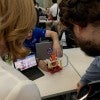
Powered by play: Engineering students blend circuits, code and imagination
Everywhere you turned at the final showcase for Design of Mechatronic Systems, something moved, danced, blinked or spun.

Senior Spotlight: Arthus Morrison de la Bassetiere ’25
Arthus Morisson de la Bassetiere, a senior mechanical engineering major and men’s tennis player from Reims, France, has his sights set far beyond the court — he wants to be one of the first French people to walk on the moon.

National Academy of Sciences elects Lydia Kavraki as a member
Lydia Kavraki, a leading researcher in robotics, computational biomedicine and artificial intelligence at Rice, has been elected to the National Academy of Sciences, one of the world’s foremost professional societies dedicated to honoring achievement in science and outstanding original research.
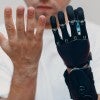
Revolutionizing touch: Researchers explore the future of wearable multisensory haptic technology
Recently, a team of experts, including Rice’s Marcia O’Malley and Daniel Preston, published an in-depth review in Nature Reviews Bioengineering analyzing the current state of wearable multisensory haptic technology, outlining its challenges, advancements and real-world applications.

Rice Robo-Rumble features epic competition between battlebots
Campus buzzed with excitement March 9 as Rice hosted its inaugural battlebots competition, the Rice Robo-Rumble.
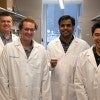
Rice researchers harness gravity to create low-cost device for rapid cell analysis
A team of researchers at Rice has developed an innovative AI-enabled, low-cost device that will make flow cytometry ⎯ a technique used to analyze cells or particles in a fluid using a laser beam ⎯ affordable and accessible.

Rice and UTHealth Houston advancing innovation in translational science
As a partner institution of the Center for Clinical and Translational Sciences at UTHealth Houston, Rice has received approximately $1.69 million in grant funding to support pilot projects, student training and collaborative research in bioengineering, informatics, team science and related areas.

Rice senior Cat Tran to intern at SpaceX through Brooke Owens Fellowship
Rice senior Cat-Linh Tran has been selected as a 2025 Brooke Owens Fellow, a prestigious honor recognizing exceptional undergraduates pursuing careers in aerospace.
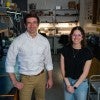
Harnessing failure as an asset: How Rice researchers are innovating smarter wearable tech
A new study by mechanical engineers at Rice’s George R. Brown School of Engineering and Computing explores how programmed failure in heat-sealable, sheet-based systems can be used to protect devices, enable complex sequencing of actions and even streamline control mechanisms.
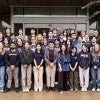
Rice Wind Energy advances to final phase of Collegiate Wind Competition
The U.S. Department of Energy has selected Rice Wind Energy as one of 12 teams advancing to the final phase of the 2025 Collegiate Wind Competition.
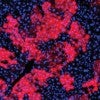
The Rice lab of bioengineer Gang Bao and collaborators at Baylor College of Medicine have developed a new gene-editing strategy that dramatically boosts the effectiveness of gene therapies in the liver, a breakthrough that could lead to new treatments for about 700 genetic disorders in this vital organ as well as in other organs and tissues.

Rice’s Lydia Kavraki elected to National Academy of Engineering
Rice computer scientist Lydia Kavraki has been elected to the National Academy of Engineering, one of the highest professional honors accorded to an engineer, for her work on “developing randomized motion-planning algorithms for robotics and robotics-inspired methods in biomedicine.”

An international team of engineers has developed an innovative, scalable method for creating topography-patterned aluminum surfaces, enhancing liquid transport properties critical for applications in electronics cooling, self-cleaning technologies and anti-icing systems.

New Rice-TMC research projects drive advances in health and medicine
Seven research partnerships involving Rice, the Baker Institute for Public Policy and various institutions within the Texas Medical Center (TMC) received seed grants in 2024 through the Provost’s TMC Collaborator Fund. These grants were facilitated by Rice’s office for Educational and Research Initiatives for Collaborative Health (ENRICH).